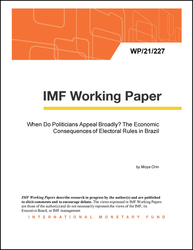
When Do Politicians Appeal Broadly? The Economic Consequences of Electoral Rules in Brazil
When Do Politicians Appeal Broadly? The Economic Consequences of Electoral Rules in Brazil
READ MORE...
Volume/Issue:
Volume 2021
Issue 227
Publication date: August 2021
ISBN: 9781513595795
$5.00
Add to Cart by clicking price of the language and format you'd like to purchase
Available Languages and Formats
| English |
Prices in red indicate formats that are not yet available but are forthcoming.
Topics covered in this book
This title contains information about the following subjects.
Click on a subject if you would like to see other titles with the same subjects.
Economics- Macroeconomics , Economics / General , Demography , Electoral institutions , voting theory , political responsiveness , political favoritism , education resources , candidate maximization problem , two-round election , voter threshold , appendix C , theory appendix , concentration of voter , swingable voter , Infrastructure , Income , Budget planning and preparation
Summary
Electoral rules determine how voters' preferences are aggregated and translated into political representation, and their design can lead to the election of representatives who represent broader or narrower constituencies. Relying on a regression discontinuity design, I contrast single- and two-round elections in Brazilian municipal races. Two-round elections use two rounds of voting to elect a winner, ensuring that the eventual winner obtains at least 50% of the vote. Theoretically, this can provide incentives for candidates to secure a broader base of support. Consistent with this, I show that in two-round elections, candidates represent a more geographically diverse group of voters, public schools have more resources, and there is less variation in resources across public schools. Effects appear to be driven by strategic responses of candidates, rather than differential entry into races. These results suggest that two-round elections can lead candidates to secure broader bases of support and to distribute public goods more broadly.
Copyright © 2010 - 2026
Powered by:
AIDC



